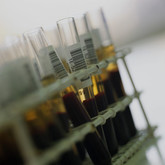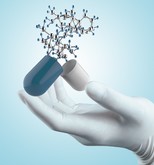Biosimilars/Research
Safety and immunogenicity of originator and biosimilar trastuzumab
A study carried out by international researchers reported results from the HERiTAge trial of Mylan/Biocon’s biosimilar trastuzumab, Ogivri (trastuzumab‑dkst) [1].
Positive phase III results for Amgen’s infliximab biosimilar
Biotech giant Amgen announced on 27 June 2018 positive data from a phase III study of their infliximab biosimilar (ABP 710) compared to Remicade (infliximab).
Biosimilars: implications for oncologists
In 2015, the US Food and Drug Administration (FDA) approved its first biosimilar, filgrastim-sndz, a biosimilar of the granulocyte colony-stimulating factor filgrastim. Since then, FDA has approved four additional biosimilar tumour necrosis factor α inhibitors, and in May 2017, the Oncology Drug Advisory Committee voted in favour of approval of an epoetin alfa biosimilar. Three biosimilar monoclonal antibodies (mAbs) have been approved in the US. Although their indications are for chronic inflammatory diseases, according to authors Robert Rifkin and Susan Peck, oncologists should become familiar with these agents, because they may need to administer these drugs for patients who have concurrent chronic inflammatory conditions [1].
Positive results for infliximab and trastuzumab biosimilars
Celltrion Healthcare (Celltrion) and Samsung Bioepis have both announced positive results for their infliximab and trastuzumab biosimilars, respectively.
Biosimilarity testing using very low doses of rituximab
Rituximab is a chimeric, monoclonal antibody directed against CD20 expressed on B lymphocytes [1]. Currently approved indications for use are non-Hodgkin lymphomas, chronic lymphatic leukaemia, rheumatoid arthritis, granulomatosis with polyangiitis and microscopic angiitis [2]. However, rituximab is frequently used ‘off label’ for the treatment of numerous antibody-dependent autoimmune diseases [3].
Scientific rationale for extrapolation of cancer indications
Extrapolation involves extending and applying the data from clinical studies regarding one medical condition to another medical condition. Once biosimilarity has been proven, biosimilars can also be approved for one or more additional indications held by the reference product, without the need for clinical data in those indications. Author Michinori Ogura from the Tokai Central Hospital, Gifu, Japan and colleagues from France and South Korea investigated the scientific rationale for extrapolation using the rituximab biosimilar CT-P10 as an example [1].
Biosimilar insulins have same efficacy and safety as reference biologicals
Researchers from the US have found that biosimilar insulins have comparable safety and clinical efficacy as their reference biologicals [1].
Savings with use of biosimilar trastuzumab for breast cancer patients in Croatia
Breast cancer is worldwide the most common cancer in women. In 2012 alone, there were approximately 464,000 new cases and 131,000 deaths from breast cancer in Europe. In Croatia, breast cancer was the fourth leading cause of death among women and ninth in both sexes in 2016.
Biosimilars and the role of regulatory authorities
According to authors Hye-Na Kang and Ivana Knezevic, from the World Health Organization (WHO), market access to biosimilars can be restricted by several factors [1]:
(i) manufacturing processes may be expensive and complex
(ii) patents on the manufacturing processes of the original product may not have expired
(iii) biosimilar manufacturers may have limited access to data on the original product
(iv) appropriate regulatory frameworks may not be in place
(v) government policies on switching to biosimilars, pricing and reimbursement may be lacking.
Life cycle and regulatory evaluation of biosimilars
The life cycle of a biosimilar, like any biological, starts with research and development, then manufacturing, and is followed by regulatory evaluation of quality, safety and efficacy for both licensing and post-licensing oversight. Once licensed, a biosimilar is an individual product and post-licensing evaluation should be carried out like any other biological. The only difference for a biosimilar is that regulatory approval relies on the safety and efficacy data and knowledge gained during the development and licensing of an originator, or reference product.
Regulating biosimilars throughout their life cycle
A resolution to increase access to life-saving biologicals was passed in May 2014 at the Sixty-seventh World Health Assembly of the World Health Organization (WHO) [1]. However, there still exist barriers to market access for biosimilars. Authors Drs Hye-Na Kang and Ivana Knezevic, from WHO, discuss the factors that give rise to these barriers and explain the importance of regulatory oversight throughout the product life-cycle of biosimilars [2].
Interchangeability between infliximab biosimilars with respect to immunogenicity
In their editorial, Katsanos and colleagues [1] discuss a study carried out by Italian and Spanish researchers on the immunogenicity of infliximab biosimilars that finds that there is full interchangeability between infliximab biosimilars with respect to immunogenicity [2].
Utilization data and cost-effectiveness of infliximab biosimilar
Studies of Celltrion/Hospira’s infliximab biosimilar (CT‑P13, Remsima/Inflectra) carried out in Canada and Germany have shown that, although there are large savings to be made, there are ‘significant differences in real-world utilization patterns’ of patients prescribed originator infliximab compared to those prescribed biosimilar infliximab (CT‑P13) [1, 2].
Secrecy is an obstacle to the use of biosimilars in the US
Factors that Professor Frank believes may be affecting uptake include naming and interchangeability guidance, insurance payment arrangements and secrecy about manufacturing processes [1]. In this article, secrecy about manufacturing processes is discussed.
Insurance payment arrangements are an obstacle to biosimilars use in the US
The slow development of the market competition for biosimilars in the US may be caused by several factors, according to Professor Richard Frank from the Department of Health Care Policy, Harvard Medical School, Boston, USA [1]. In this article, insurance payment arrangements for biologicals and biosimilars are discussed.
Biosimilars in rheumatology: the current state of play
Biological disease modifying anti-rheumatic drugs (bDMARDs) have revolutionized the management of rheumatoid arthritis (RA) and other inflammatory diseases. Over two decades, their use has risen exponentially but their significant cost has contributed to increasing healthcare expenditure in many countries. Biosimilar development is an opportunity to lower drug expenses and optimize use. This review detailed the current state of biosimilars in rheumatology, including their development, trial data, economic impact and logistical considerations [1].
Interchangeability is an obstacle to the use of biosimilars in the US
According to Professor Richard Frank from the Department of Health Care Policy, Harvard Medical School, Boston, USA, there are several factors that may account for the slow development of the market for biosimilars in the US [1]. In this article, the issue of interchangeability of biosimilars is discussed.
Phase I study of biosimilar trastuzumab demonstrates equivalent pharmacokinetics to reference product
Trastuzumab, a recombinant humanized monoclonal antibody, acts against the tyrosine kinase human epidermal growth factor receptor 2 (HER2), which is overexpressed in up to 30% of breast cancers and gastric cancers and has been linked to poor prognosis. In the age of targeted anticancer therapy, trastuzumab is a key treatment for patients with HER2-positive (HER2+) tumours and is recommended by a number of clinical guidelines. However, the use of ‘originator’ (or reference) biologicals, such as trastuzumab, is associated with high treatment costs; an issue set to be exacerbated by an ageing population. The improved cost-effectiveness potentially provided by a biosimilar may increase patient access to treatment.
Afucosylated biosimilars: the path to matching interrelated critical quality attributes
Advances in analytical characterization and increased understanding of drug mechanisms of action have resulted in the ability to raise the quality and safety of biosimilars by introducing critical quality attributes (CQA), which must be preserved during the manufacturing process. However, to realize these benefits, biosimilars manufacturers must develop the means to ensure these CQAs are met. For afucosylated IgG1s that rely on afucosylation content for efficacy, this has been challenging, since precisely matching both afucosylation content and biological activity has proven to be extremely difficult. In a recent paper, Chung and Zhan [1] elaborate on the underlying basis of these difficulties and highlight the work of several groups that has opened a path to directly addressing this problem.
Naming is an obstacle to the use of biosimilars in the US
Factors that may account for the slow development of the market for biosimilars in the US are discussed by Professor Richard Frank from the Department of Health Care Policy, Harvard Medical School, Boston, USA [1]. In this article, the factor of biosimilars naming is discussed.




















